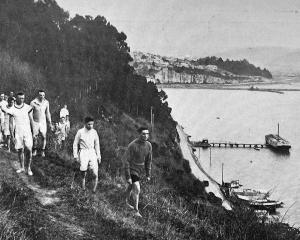An experiment in carrying eggs between New Zealand and Australia in such a way as to ensure their landing in a fertile condition is being made by Mr T. Clarke, second officer of the steamer Victoria. Complaints have been numerous lately as to the infertile condition on delivery of prize eggs. This is attributed to the rolling of the ship or rough handling.
With a view of getting over this difficulty Mr Clarke has suspended a tin from the ceiling. This swings on the same principle as a compass, so that, in spite of the rolling of the ship, the tin is always in a level position.
On the top of the tin a cardboard box containing the eggs is firmly fixed, while attached to the cord holding the tin are several springs, to prevent jarring. The eggs at present in the care of Mr Clarke are from prize birds, and it is hoped they will be successfully hatched at Sydney. Mr Clarke will bring two settings of eggs on his return, one setting being carried in the way just described, and the other in the customary method, in an ordinary box or drawer. The eggs will be hatched at the new model poultry farm at Napier.
• The Hawke's Bay Tribune, in view of the suggested enforcement in that district of the by-laws relating to the rule of the road and the speed of vehicles, makes the suggestion that in the case of two vehicles arriving at an intersection of roads at the same time, the same rule as that applying to ships be observed. At sea the rule of "the road," in the case of two vessels approaching in this way, is for the one on the port bow to continue on its course without reducing or increasing speed, while the other vessel slows down. If this principle were brought into practice the danger arising from hesitancy and uncertainty would be obviated, as each driver would know exactly what the other was going to do.
• The Palmerston Times states that wild pigs are said to be very numerous on the hills near Waikouaiti at present. Messrs J. Summers and F. Connelly shot four pigs, one of which - a huge black boar - weighed 300lb. The hide of this animal was upwards of 2in in thickness, but, unfortunately, the tusks, which had apparently been of enormous length, had been broken off near the head.
• Whilst steaming down from Lyttelton , the Union Company's steamer Warrimoo was in wireless communication with Cocos Island. Mr J. B. Stephenson, the operator in charge of the Warrimoo's wireless outfit, reports that he picked up the Cocos Island station at 0.40 a.m. yesterday at a distance of 4,341 miles.
This constitutes a record distance for any vessel in Australasian waters, and was probably due to the fact that the atmospheric conditions were exceptionally favourable at the time.
The record distance for the world is a little over 6000 miles.
• A correspondent of the Christchurch Press points out that by means of quite a small wireless plant the home and back stations could easily maintain a communication while the country is blocked with snow-drifts. In many instances the telephone wires carried on the ordinary fencing have more than once proved very useful. In one instance on an up-country station, a shepherd who had been snowed in for some time at the outlying hut, was entertained from the home station with the latest news and musical items from a piano and gramophone. - ODT, 24.8.1912.












